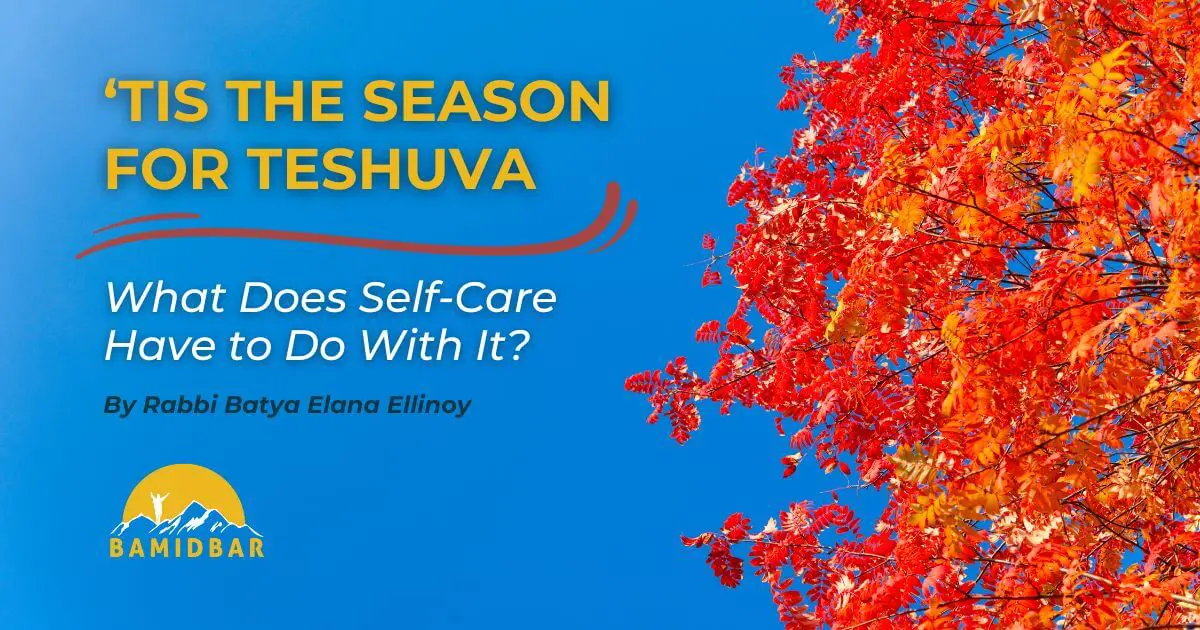By Rabbi Batya Elana Ellinoy
 Teshuva
Teshuva
Teshuva, or repentance, is a dynamic process in which we intentionally turn our attention to reflect on the mistakes we have made, how we have acted out of alignment with our integrity, and to then act to seek repair.
Whether the repair takes place in our interpersonal relationships or how we relate to the Source of Life, it is by way of self-examination (known as cheshbon hanefesh) that we repent and return to integrity in doing the best we can to live an ethical, kind, responsible, and joyous life.
Although we engage in teshuva throughout the year, during these Days of Awe, we are in a deeper and more intensive exploration.
Teshuva and Self-Care
The word teshuva תשובה derives from the root שוב, which means to turn or return.
Teshuva can also be understood as returning to the value and practice of taking good care of ourselves. The Torah offers a core instruction on tending to ourselves toward the beginning of the book of Deuteronomy:
רַ֡ק הִשָּׁ֣מֶר לְךָ֩ וּשְׁמֹ֨ר נַפְשְׁךָ֜ מְאֹ֗ד פֶּן־תִּשְׁכַּ֨ח אֶת־הַדְּבָרִ֜ים אֲשֶׁר־רָא֣וּ עֵינֶ֗יךָ וּפֶן־יָס֙וּרוּ֙ מִלְּבָ֣בְךָ֔ כֹּ֖ל יְמֵ֣י חַיֶּ֑יךָ וְהוֹדַעְתָּ֥ם לְבָנֶ֖יךָ וְלִבְנֵ֥י בָנֶֽיךָ׃
Deuteronomy 4:9But take utmost care and watch yourselves scrupulously so that you do not forget the things that you saw with your own eyes and so that they do not fade from your mind all the days of your life. And make them known to your children and to your children’s children. (JPS)
This instruction is offered as the Israelites are engaging in a process, facilitated by Moses, of turning their attention to recall the journey they have endured and the lessons to be learned from their travails in the wilderness.
With their own eyes (or through the eyes of their ancestors), they witnessed the miracle of their passage into freedom from oppression, God’s awesome and frightening presence at Mt. Sinai, the manna that nourished them everyday, rebellions and other manifestations of disorientation, grief, growing pains, and loss.
Throughout the stresses of their time bamidbar (in the wilderness), they also saw the consistent experiences of a Source of Life that took care of them and that desired connection with them. The Torah stresses that they must take utmost care of themselves as a prerequisite to keep these recollections alive in their minds and hearts throughout the days of their lives, to recall that they have resiliently endured the highs and the lows, and to pass this sense of resiliency on through the generations.
For us today, we can receive this direction to take care of ourselves with an emphasis on taking care of our nefesh, a word that often refers to our mind or our spirit. We are encouraged to tend to our mental and spiritual well-being – that which we know is intertwined with our overall health.
We are to engage in this shmirah, this guarding and protecting, so that we can maintain connection to seeing and being aware of the blessings and support that are within and all around us.
I invite you to try a brief exercise of Shmirat HaNefesh, of self-care.
As you pause from reading for a moment, allow your neck and eyes to move slowly around the space you are in to observe whatever is to one side and then the other, perhaps even slowly and gently looking behind and above you. As you look around, what are blessings of goodness and good fortune that you see with your own eyes at this moment? If you don’t see anything that you count as a blessing, what might you imagine there with you that would be a blessing?
Let yourself linger here for a breath or two (or however long you wish!).
As you engage in this practice of caring, turning, and opening to the present moment, what is the impact it has on you?
Perhaps you notice a sense of slowing down, a deep breath, a bit more ease and sense of connection to where you are sitting, or maybe the noise of the world is even a tiny bit softer for a moment.
What does turning toward self-care look like in practice for you? What gets you into a state of mind in which you feel that you have access to the blessings surrounding you? It could be going for a walk, going to the gym, calling a friend, spending time with loved ones or a pet, taking a bath, listening to music, reading a favorite book, or simply having a good laugh or cry. It could also look like keeping a Shabbat practice, visiting the sick, giving tzedaka, or engaging in prayer.
Window of Tolerance
These and many other practices of self-care support us to return to and remain in what is referred to as the Window of Tolerance.
The Window of Tolerance, attributed to the research of Dr. Dan Siegel, is the zone in which we are able to adaptively respond to and cope with the inevitable stressors of our lives. When we are within our Window of Tolerance, we can engage in flexible and higher-level thinking, effective communication, and relate well to ourselves and others.
It is in this zone where we have access to empathy, openness, curiosity, and capacity for learning and play. We are able to stay aware and sustain connection to our bodies and a sense of self with greater capacity to respond and manage one’s feelings and impulses in stressful situations.
Climate neuropsychologist Dr. Barbara Easterlin relays how being in the Window of Tolerance “allows for creative and meaningful engagement in life.” What may be revealed when we take good care of ourselves and our well-being, tending to what returns and keeps us in our Windows of Tolerance as a foundation for sustainable teshuva?
Window of Tolerance and Teshuva
Shmirat HaNefesh (tending to our spirits) could be considered essential for Cheshbon HaNefesh (radical self-honesty and accounting).
We must be in our Window of Tolerance to tolerate where we’ve been out of integrity. Guarding our well-being is part of what resources us to be able to move through any unpleasant feelings of shame or regret that may arise as we face our mistakes. Armed with greater compassion, we can take action towards repair while remaining in contact with our hearts and selves as we do so.
When we are in touch with the blessings that surround us and hold us, along with an innate, positive, embodied knowing that we belong, the impulse for teshuva can organically emerge. This sense of belonging is itself another understanding of teshuva and what is accessible when we are in our Window of Tolerance.
Even our liturgy on Erev Yom Kippur offers us an opportunity to place us directly into our Window of Tolerance.
Right after Kol Nidre is chanted and before, as a community, we begin to take the deepest dive into owning and acknowledging the ways we’ve behaved unkindly and unethically for the next 24 hours, the liturgy brings in a verse from the book of BaMidbar (Numbers) 14:20, as God responds to Moses.
וַיֹּ֣אמֶר יה סָלַ֖חְתִּי כִּדְבָרֶֽךָ׃
“And YHVH said, I forgive you, as you have asked.”
We’ve barely begun before we are given a powerful message that we are already forgiven.
How could this not get us into a state of mind in which we feel blessed and thus with increased capacity to respond and engage in teshuva with curiosity, openness, and courage to make amends?
We are in relationship with a God who has already pardoned us! From this place of connection and belonging, we can move into and through the intense and holy transformational work of teshuva in supported, meaningful, and perhaps even joyous ways.
This High Holyday season, and always, may we find and be comforted by easeful practices of Shmirat HaNefesh, of tending to ourselves, so that we may turn to be in ever-deepening connection with the resiliency and beauty of our interconnected spirits.
May we intimately know this connection to our resilience so that not only will it not fade from our awareness, but so that we may be inspired to turn toward kindness, creativity, joy, and vitality for ourselves and all beings, all the days of our lives.
Rabbi Batya Elana Ellinoy is the Rabbi-in-Residence at BaMidbar.

